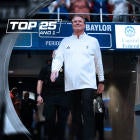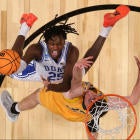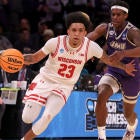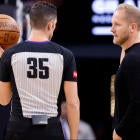The University of Memphis initially tried to talk Austin Nichols out of transferring. But that didn't work. So it then refused to grant him a release before, two days later, announcing it would actually grant a release with conditions before, five days after that, announcing the 6-foot-8 forward and former five-star recruit is now free to transfer wherever he wants.
Now that's an about-face if I've ever seen one.
I mean, in a span of eight days, an athletic department led by a man named Tom Bowen went from playing hardball with an amateur athlete to completely caving to an amateur athlete whose family hired a lawyer and promised to fight. And the embarrassing debacle for Josh Pastner's program should serve as a lesson for all schools and student-athletes.
For the schools, it's simple: Don't fight or risk embarrassment.
For the student-athletes, it's also simple: If a school fights, fight back and fight loudly.
"The restrictions are nothing more than a calculated effort to punish Austin's family for his desire to transfer. ... This is a calculated effort by a dysfunctional staff to punish a player for taking a step to remove himself from a failing program."
That's part of a statement Don Jackson, Nichols' attorney, released Tuesday afternoon.
It was direct and scathing.
He threatened to take the issue to federal court.
And though there's literally no example of a student-athlete fighting transfer restrictions in federal court and winning, Memphis must've realized that fact is so beside the point. What the Nichols family made clear by hiring Jackson and releasing that statement is that they wanted to transfer to some place on the initial restricted list -- multiple sources have told CBSSports.com that place is Virginia -- and that they were going to keep fighting and releasing statements that generated negative headlines until the school relented.
Given this reality, Memphis was always going to relent.
The only problem is that it took eight days too long to relent.
Which caused Memphis to endure a public relations nightmare, and for what?
What folks connected to the Memphis program would tell you is that they believe somebody working on behalf of Virginia tampered with Nichols. And that tampering is wrong. And that, combined with the timing, is why they put those restrictions on him.
I get all that.
(And, for the record, yes, I do believe tampering occurred.)
But I also don't care -- about that or the timing or anything else.
My longstanding position on transfers is that it's fundamentally unfair and wrong to restrict them in any way, and I explained why in this column from two years ago. But I'm also smart enough to know not everybody agrees with me -- including Bowen and Pastner. So let's skip that debate today and focus instead on something we should all be able to agree on, and that's that it's a colossal mistake for any school to try to strong-arm an amateur student in an era when the limited rights of student-athletes are under more scrutiny than ever.
You might be OK if the student goes away quietly.
But it's a nightmare if he or she doesn't.
And Memphis learned that over the past week.
By denying Nichols what he wanted from the outset -- and then making it more difficult than it should've been -- Memphis turned what could've been a one-day story into an eight-day story, and the school came off looking petty at first and weak in the end. Memphis didn't ultimately decide to do what's right as much as it caved under pressure, and it didn't cave until after its best player's attorney called the staff "dysfunctional" and the program "failing."
Yikes, right?
So let's all learn from this, OK?
It no longer matters how you or anybody else feels about transfer restrictions. All that matters is that, in this era, if you assign restrictions to a transfer there's a good chance you're going to be publicly criticized for it. And it might get nasty. And it'll almost certainly be damaging. And, by the time things settle, you'll likely give-in with bruises. So the wisest approach, it seems, is to just be cool from the start and avoid the backlash completely





















